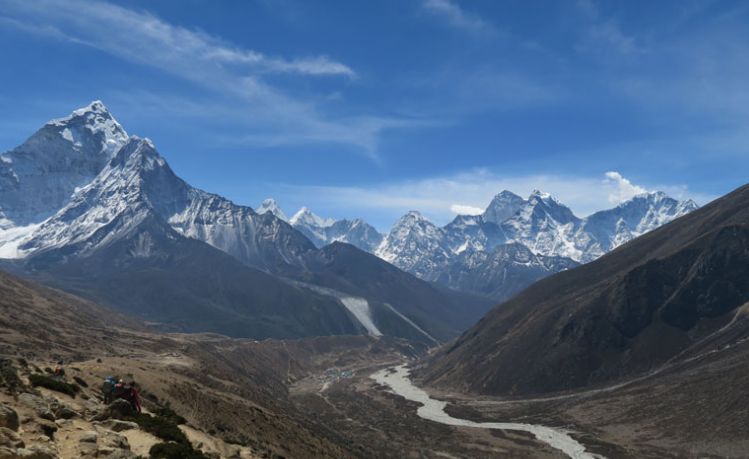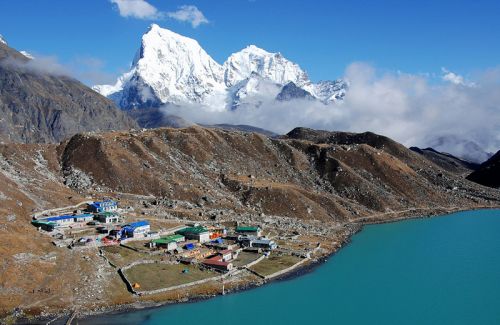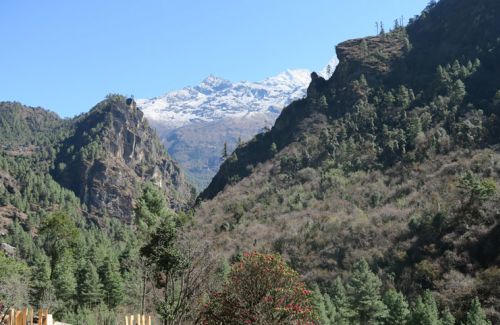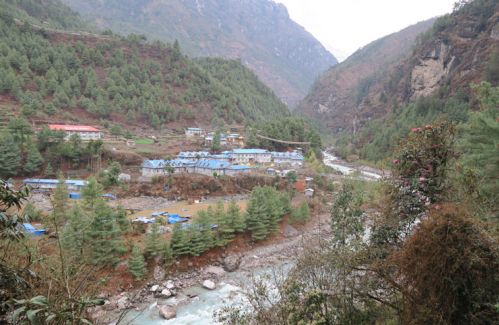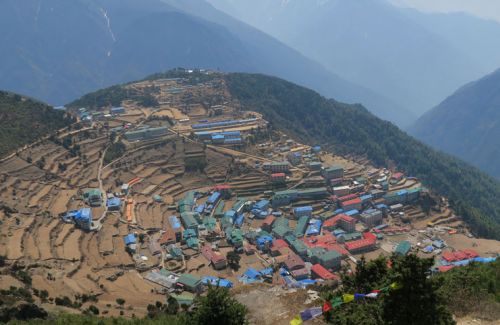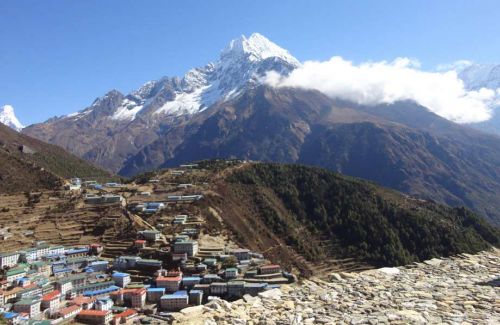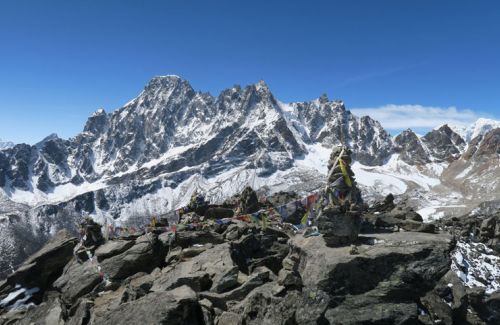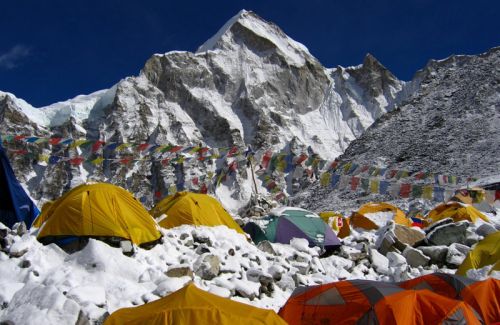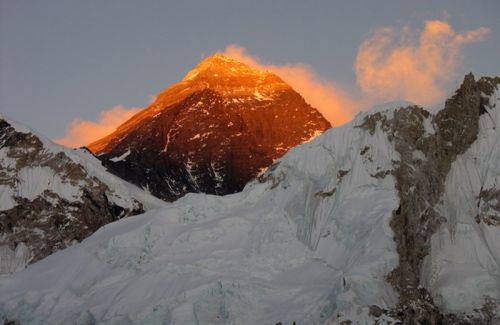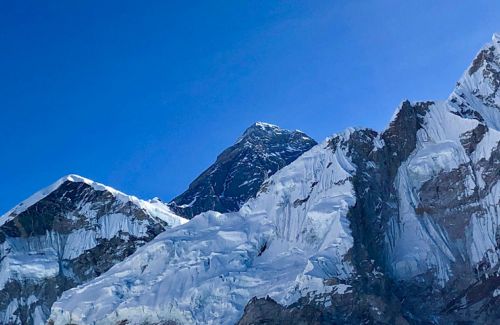Everest Base Camp for Beginners
- Duration18 Days
- Max. Altitude5545 m
- Starts FromUSD 1450
Destination:Nepal
Trip Grade:Strenuous (****)
Meals:Breakfast + Lunch + Dinner
Transportation:Private Vehicle / Aeroplane
Accommodation:Lodge
Trek begins from:Lukla
Show AllImagine being able to stand at the foot of the tallest mountain on earth, surrounded by the beauty and majesty of 8000m peaks of rock, ice and snow. Imagine the sense of achievement in saying that you had made it their under your own steam. Your own body, your vehicle. Every step you taking you further and further into the wild, transporting you through some of the most breathtaking scenery on the planet. Following winding rivers, forests of fir, pine and black juniper and witnessing magnificent glaciers slowly drifting down the slopes of the colossal himalaya. Meet the humble, kind and friendly Sherpa in their villages and try a taste of mountain life. What an adventure. This could be your adventure. This should be your adventure. Whats stopping you?
The Everest base camp trek is an adventure that you will never forget. It is suitable for everyone with a moderate level of fitness. You do not have to be a skilled mountaineer for this expedition. Our guides will lead you every step of the way so you will just have to keep on walking, taking in the views and enjoying the experience. The Everest trek, with Himkala Adventure, is affordable whilst still being meticulously organised. You will be looked after from the minute you show interest, and the arrangements for the trek, from airport picks ups to accommodation, will be looked after by us.
Below is a list of reasons why we know that you can conquer this challenge with us:
- A very well maintained trail. That means no mountaineering experience required whatsoever.
- Accommodation to suit your comfort needs. From camping to luxury hotels. You decide.
- Specified acclimatisation days to let your body adjust to the altitude.
- Highly trained, experienced mountain guide to lead the way and deal with any situations should they arise.
- Information and rescue centre at Pheriche should any difficulties arise.
Trip Highlights
- Kathmandu day sightseeing
- Scenic mountain flight from Kathmandu - Lukla - Kathmandu
- Explore Himalayan Sherpa culture
- Take rest at Namche Bazaar and acclimatize, walk around and feel it
- Visit Tengboche monastery and see monastic performance
- Trek to Everest Base Camp and view sun rise from KalaPatthar
Day to Day Itinerary
Day 01:Arrival in Kathmandu (1,350 m) and Transfer to hotel. Overnight at hotel
Day 02:Pre-trip meeting and Kathmandu full day sightseeing. O/N at hotel
Day 03:Drive to airport, fly from Kathmandu to Lukla (2840 m) and trek to Phakding (2650 m). O/N at Lodge
Day 04:Trek from Phakding to Namche Bazaar (3440 m). O/N at Lodge
Day 05:Acclimatization at Namche Bazaar
Day 06:Trek from Namche Bazaar to Tengboche (3860 m). O/N at Lodge
Day 07:Trek from Tengboche to Dingboche (4345 m). O/N at Lodge
Day 08:Acclimatization at Dingbochhe, hiking around
Day 09:Trek from Dingboche to Lobuche (4930 m). O/N at Lodge
Day 10:Trek from Lobuche to Gorakshep (5200 m) and trek to Everest Base Camp. O/N at Gorakshep
Day 11:Early morning hike to KalaPatthar (5555 m) then return back to Gorakshep, then trek to Pheriche (4240 m). O/N at Lodge
Day 12:Trek from Pheriche to Tengboche. O/N at Lodge
Day 13:Trek from Tengboche to Namche Bazaar. O/N at Lodge
Day 14:Trek from Namche Bazaar to Phakding. O/N at Lodge
Day 15:Trek from Phakding to Lukla. O/N at Lodge
Day 16:Fly back to Kathmandu from Lukla. O/N at Hotel
Day 17:Leisure day in Kathmandu, shopping around local market. O/N at Hotel
Day 18:Departure to International airport
Cost Include
- Airport Picks up and drops-off by private tourist vehicle
- Guided city tour by private tourist vehicle
- A full day sightseeing at UNESCO World Heritage Sites in Kathmandu
- A government licensed holder city tour guide
- 4 nights in Kathmandu in twin sharing basis 2-3 star hotels with breakfast
- Flight from Kathmandu - Lukla - Kathmandu
- Lodge to lodge accommodation during the trek
- Full board meal (Breakfast + Lunch + Dinner) during the trek
- An experienced English speaking trekking guide
- The required number of local staffs and porter (2 Trekkers = 1 Porter)
- Food, accommodation, salary, insurance. equipment and medicine for guide and porter
- Sagarmatha National Park entry permit and TIMS card for trekking
- Down jacket, duffel bag and sleeping bag by Himkala Adventure (If required)
- Farewell dinner in the typical Nepalese reataurant with cultural show
-
Government Taxes, VAT, and service charge
Cost Exclude
- Lunch and dinner in Kathmandu
- Entrance fees in the Heritage Sites in Kathmandu
- Your travel insurance
- Nepal entry visa fee
- Emergency rescue and evacuation
- Personal expenses (Phone calls, laundry,bar bills, battery recharge, bottled or boiled water, shower etc.)
- Tips for guide and porter
- Personal trekking equipment
-
Any other expenses which are not mentioned in Cost Includes Section
Trip FAQ
Our Guides
Who will be guiding me during this trip?
Our guides are trained by the Nepal Academy of Tourism and Hotel Management, certified and approved by the Tourism Department of the Nepal government. The guides hold professional English speaking licenses and we can also provide French, Spanish, Japanese, German and Italian speaking guides by request. Our guides are local Nepali people who have been carefully selected on the basis of their appropriate experience, leadership skills and personality.
What sort of experience do your guides have?
Our trekking guides are experts in Himalayan trekking and have on average over 10 years of trekking experience. Many of them are from neighboring villages and have a lifetime’s worth of knowledge about the routes and precautions to take. In addition to having their guide certification, all our guides have a hold at least a Master’s Degree and have excellent command of the English language. They are also trained in first aid.
Do I really need a guide to do the Everest Base Camp trek?
The Everest Base Camp trek takes you through wilderness, remote countryside, and high elevations in unpredictable weather conditions. In addition, few locals along the trail speak English. Trekking with a guide is not only safer but more enjoyable! Our experienced guides will navigate through safe routes and help you to take proper shelter, all while explaining the local culture and sharing opportunities to interact with the local people.
Preparation
What is the best season for this trekking?
The best season for Everest Base Camp Trekking is spring (March to May) and autumn (September to December). These are the perfect times to see breathtaking views of the Himalayas.
What is the weather and temperature like during the trekking?
The climate in Nepal varies from place to place which can be categorized in different four main seasons. The main seasons in Nepal are spring (March to May), summer (June to August), autumn (September to November) & winter (December to February). The best season to travel in Nepal is autumn (September, October & November) & spring (March, April & May). Weather in the mountains is unpredictable, but the day temperature in Everest Base Camp trekking is comfortable.
What type of shoes should I wear during Everest Base Camp trekking?
We recommend hiking boots made of strong but light material with extra laces. It is best to buy shoes and boots before arriving in Nepal. We advise you to wear your new shoes for sometime before the trek to break them in.
Do I need to have insurance for this trip?
We request you to have a travel-insurance policy to cover theft, loss, medical problems, and emergency helicopter evacuation from high altitudes before coming to Nepal. Please make sure your travel insurance policy includes mountaineering or alpinism, as well as international medical evacuation insurance to cover an emergency helicopter evacuation or a charted flight from the remote mountain trails. Without insurance, a helicopter evacuation might cost $2500-$10000 USD depending on the location.
During the Trek
May I charge my electronic gadgets during Everest Base Camp trek?
Most teahouses have charging facilities. You can charge your devices by paying some extra money. It’s recommended to bring a travel adapter and to put your gadgets in a warm place at night.
How much additional money is required for this trip?
In Kathmandu you can allocate about 10-15 USD per person per meal. During the trek, 10-15 USD 10 to USD per person per day will be sufficient to buy bottled water, chocolates, and hot showers during the trek.
Are there communication or internet services during Everest Base Camp trek?
All guesthouses/lodges along the Everest Base Camp trail have telephones and internet services. They provide WIFI service for an extra charge. All our guides carry a local mobile phone. You can use his mobile phone to make any local or international call from trekking trails by paying him directly. We highly recommend having a local SIM card for call and internet services during trekking. Local SIM cards are easily available in many stores and at the airport as well. You will need to provide a passport photo and a copy of you passport to get a local SIM card from NCELL or NTC, the only 2 mobile providers in Nepal.
Can I use credit cards in the Everest Base Camp trekking route?
No, you can only use credit cards in cities like Kathmandu. There are ATMs in Lukla and Namche Bazaar but we don’t recommend you to rely on them. It is better to exchange money in Kathmandu before you go to the mountains. Outside of the cities, it is best to have cash, and in small notes.
May I add extra days in trekking?
If you have more days to spare, you could easily extend your trek with some side trips to the nearby Sherpa Villages or can deviate to other routes. If you would like to customize or shorten your trip, it is possible as well.
What happens in case of emergency?
Himkala Adventure is prepared for any emergency situation. Our guides are trained in first aid and can deal with most of the basic ailments that occur during the trek. Every client should have his own insurance before coming to Nepal in case of emergency.
Do I need to tip my guide and porter? How much would that be?
Tipping is not mandatory but it is a greatly appreciated way of showing gratitude after you have completed this trek. We recommend you to tip a minimum 10% of your total trip cost for tipping the local staff. The ratio of tipping breakdown between the guide and porter will be given to you at the pre-trip meeting in Kathmandu before starting the trek.
What is the social and environmental responsibility of Himkala Adventure for this trip?
The environmental situation in Nepal is threatened by global warming, human activities, and the adverse effects of natural incidents. With the ozone layer depleting, the atmosphere is getting heated and the snow in the Himalayas is melting day by day, causing sea level to rise. Population growth is causing deforestation and soil erosion in Nepal. Himkala Adventure is concerned with the social and environmental implications of trekking. We are very conscious of not littering in the open spaces and manage garbage properly. We are working together with other companies and the local people in taking these issues seriously.
Trip Note
Cost:
The cost of trip varies according to the number of travelers in the group, the category of the Hotel, mode of the transportation and any kind of changes (if there is). So, if you would let us know all of these above mentioned things, then we could quote you the exact price
Essential Documents:
You are requested to send the following documents after you book the trip:
A copy of your passport and travel/health insurance documents with contact details, three passport size photos.
It is advised to maintain a separate photocopy of all important documents including traveler’s cheques, bank/ATM card, contact numbers, international flight tickets, and emergency contact numbers.
Walking Trails:
There are stone steps up and down in most of the trekking routes in Annapurna Region. So, you might find a pair of trekking poles very useful.
Weather:
The main trekking season in Nepal is from October to December and March to May. The day temperature for walking in Annapurna region is comfortable. The sky is clear although there is snow and rainfall occasionally. It is about 10 degree centigrade at the height of 3,600 m and increasingly lower, the higher we go. There may be snow at Annapurna Base Camp at any time of the year.
Transport
A traveler to/from Lukla is allowed to carry 10 kg of check-in luggage and 5 kg of carry-on hand luggage per person with his/her flight ticket. Excess baggage (up to 5 kg per person only) will be charged at 120 NPR per person at your own expense.
Extreme Weather and Airport Closures
Weather conditions in the Himalayas are unpredictable. Flights can be cancelled or delayed due to bad weather. Flights to and from Lukla are particularly prone to travel delays. There is no other alternative except having patience for the good weather or have some optional trip around or chartering helicopters. You will be accommodated at your joining hotel at your own expense.
Nepal Strikes
There is much more progress in the political scenario in Nepal and we assure you that travelling in Nepal is safe. But there may be Bandha (wide transport strikes) at a very short notice. The shuttle bus is in operation by Nepal Tourism Board and the Nepal Tourist Police in conjunction with the Himalayan Rescue Association from domestic and international terminal to the various hotels in Kathmandu. The service costs 300 rupees per person.
Itinerary Disclaimer
Himkala has thoughtfully designed all the itineraries but our itineraries are updated for the betterment on the basis of our past travelers’ comments and our own research. In case you find changes in the itinerary you printed and the upgraded one does not affect your trip. Please note that some changes may occur in our itineraries due to bad weather and common seasonal changes to timetables and transport routes.
Physical Rating
Your trip will be meaningful if you could find yourself fit and fine. You will be walking up to 5545 m from the sea level. As the geographical region varies, there is a temperature variation as well. So, we advise you to undertake regular physical exercise, jogging, hiking, riding, ascending and descending the long stairs etc.
Group Size
Himkala Adventure organizes solo to group travelers. Our group trips are designed for sharing accommodation and there is no single supplement. Single travelers share with the same gender from twin to multi-share in an accommodation. You are requested to have mutual understanding in between the fellow travelers who have joined from the different parts of the world. Please remember that you have great responsibilities in the group. If you are requested to be at a particular place at a certain time, make sure that you have been there at a time. It is much more pleasing sharing experiences and traveling together.
Accommodation and Meals
Accommodation and Foods in the Himalayan region of Nepal cannot be compared with any developed countries in the world. We know that you might not have experienced such things before but you should take it easy. Accommodations at local lodges are simple but clean and comfortable. The food is plain. Toilets and washing facilities are shared and rudimentary. In high altitude regions, there are very few tea houses and one has to be happy to share in simple dormitories without electricity, without running water. Hot shower means a bucket of hot water upon our request.
Money Matters
Please note that most establishments in Asia will not accept foreign currency notes that are old, torn or faded and they can be very difficult to exchange or extra fees added when exchanging at banks. Please ensure that you have new, clean notes.
The official currency of Nepal is the Nepali Rupee (NPR). ATMs can be found only in major cities of Nepal like Kathmandu, Pokhara, Chitwan, Bhaktapur etc. The government of Nepal has banned the import, export and use of 500 and 1000 Indian rupee notes in Nepal. You make sure that you won’t carry these notes upon arrival in Nepal, otherwise they are confiscated and you may be fined.
Please make sure that the foreign currency notes that you have are new and clean notes because old, torn or faded foreign currency notes in Nepal are very difficult to exchange or extra fees added when exchanging at banks.
While travelers cheques have security advantages exchanging them can be a lengthy process, commissions can be high (up to 10%) and they can be difficult to change in rural areas, on weekends and public holidays. If you choose to bring travelers’ cheques, make sure they are a major brand and major currency.
Tipping
Tipping is not mandatory. It is not anyone’s right asking for tips but if you are happy with the service, you could tip the staffs. It is entirely a personal preference. Tipping could be significant to them who took take great care of you in your traveling period. Himkala recommends that you could tip any intended recipient by any member of the group than collected and passed on by the group leader.
Note: Please do not tip with coins or dirty and ripped notes. This is culturally taken as an insult.
Local Dress in Nepal
Nudity is a sensitive issue in Nepal. Women should avoid wearing shorts and sleeveless tops in public places where this might be seen as inappropriate. Remove shoes before entering certain holy places. Non-Hindus are not permitted in some temples.
Feedback
Your feedback will be the great guidance to meet our target and to bring improvement in our service. What and how have you experienced with Himkala Adventure and our staff? Please write, we will read it carefully. One cannot see his/her shortcomings that are lying with them. Someone should point it out. We are always eager to hear from you.
Trip Info
- Conservation
- Cross Cultural Issues
- Essential Do’s and Don’ts
- Foot Ware/Foot Care
- Health and Fitness
- Himkala Crews
- Hypothermia
- Safety and Security
- Travel Insurance and Evacuation
- Trip FAQs
- Washing and Shower
- Water/Food and Nutrition
- Weather
- Trip Grading
- Accommodation/Shelter
- Altitude Sickness
- Communications and Updates
- Equipment List
